Key takeaways:
- Organic cotton is grown sustainably, avoiding harmful pesticides and chemicals, contributing to a healthier planet and ecosystem.
- The fabric is hypoallergenic and durable, making it beneficial for sensitive skin and providing long-lasting use.
- Choosing organic cotton supports ethical farming practices, fair wages for workers, and promotes community welfare.
- Handmade organic cotton products offer a unique comfort and emotional connection, enhancing personal living spaces.
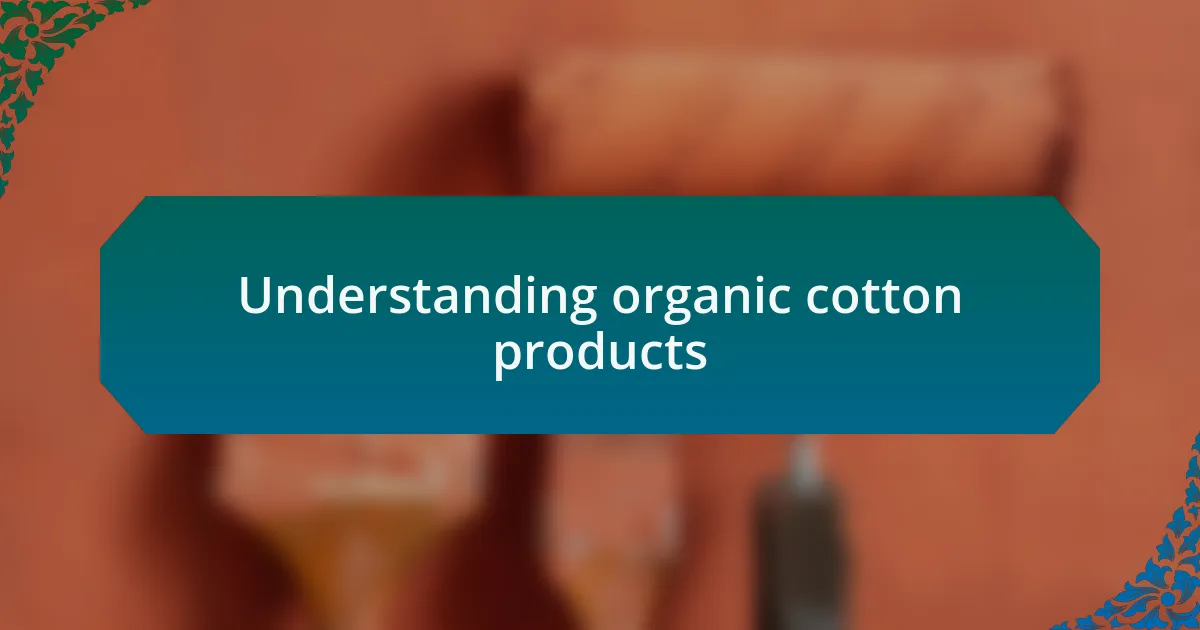
Understanding organic cotton products
When exploring organic cotton products, it’s essential to appreciate what sets them apart. During a visit to a local farmer’s market, I met a passionate grower who shared the journey of organic cotton from seed to fabric. Hearing about the natural farming processes and the commitment to avoiding harmful pesticides and chemicals made me reflect on the impact my choices have on both my health and the planet.
Organic cotton is grown using methods that preserve the environment and enhance biodiversity. This means not only healthier clothing and home goods but also a safer ecosystem. I often think about how every purchase is a vote for the kind of world I want to live in. Isn’t it rewarding to support practices that prioritize sustainability and ethical farming?
Furthermore, the softness of organic cotton against the skin is something I can’t overlook. I remember how my first organic cotton throw blanket felt – luxuriously soft yet sturdy. It creates an inviting atmosphere in my home, reminding me of the thoughtful process behind its creation. This personal connection to the materials I use ultimately deepens my appreciation for handmade goods and the stories they carry.
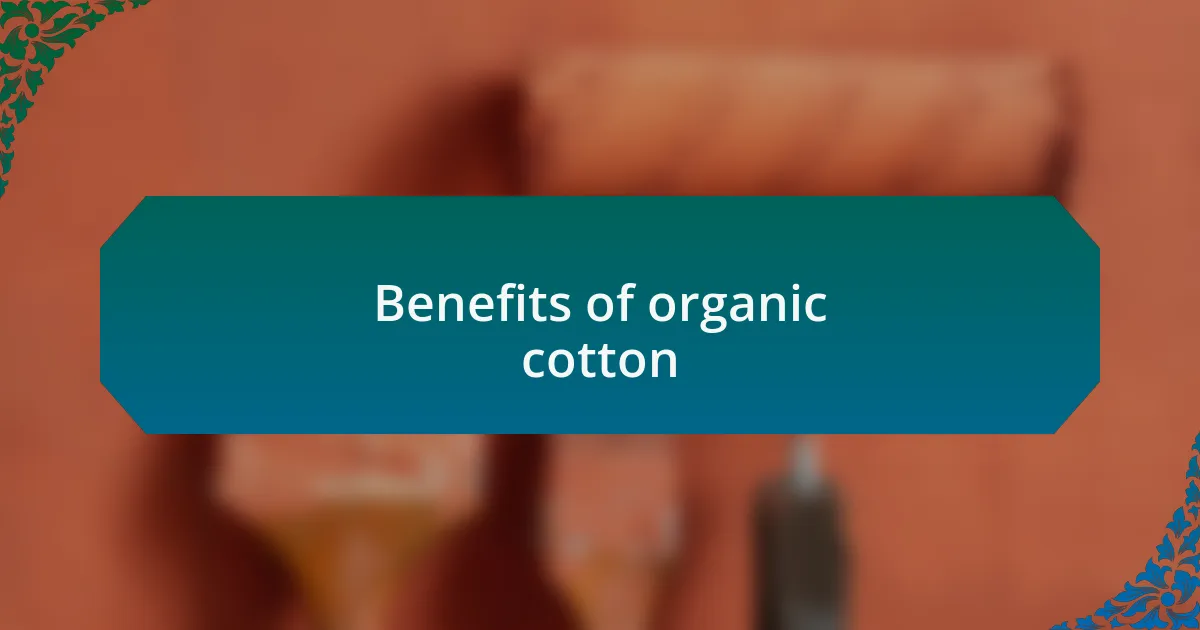
Benefits of organic cotton
Organic cotton offers remarkable benefits that extend beyond personal comfort. One significant advantage is its reduced environmental footprint. I often think about the contrast between traditional and organic farming methods; by choosing organic, I’m not only supporting sustainable practices but also ensuring a healthier planet for future generations. Isn’t it empowering to know that our choices can make a real difference?
The hypoallergenic nature of organic cotton is something I personally value. I once gifted a set of organic cotton sheets to a friend who has sensitive skin, and the relief she experienced was truly heartwarming. She mentioned how she could finally enjoy a good night’s sleep without irritation, illustrating just how impactful this fabric can be for those with skin sensitivities. Don’t you think it’s incredible to consider how something as simple as bedding can contribute to our overall well-being?
Finally, organic cotton products are often more durable than their conventional counterparts. I still remember when I purchased an organic cotton tote bag that has withstood years of use without fraying or losing shape. Each time I use it, I feel a sense of pride in owning something that’s built to last while also supporting responsible practices. How often do we find items that combine longevity with ethical sourcing?
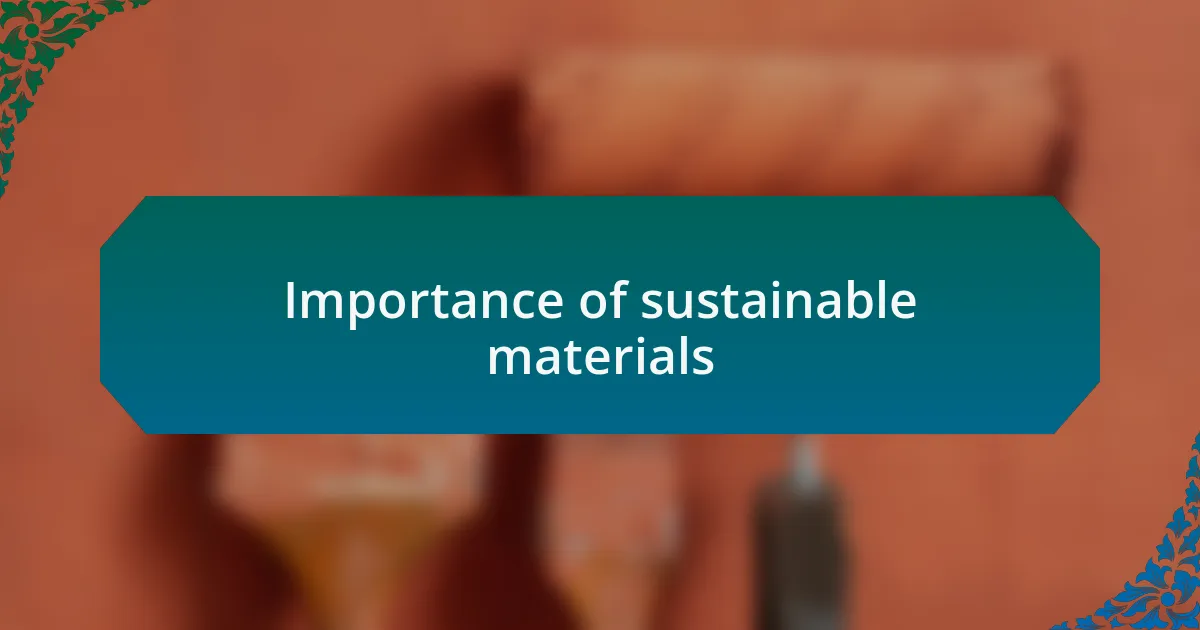
Importance of sustainable materials
Sustainable materials, like organic cotton, play a crucial role in reducing waste and conserving resources. I remember when I switched to organic cotton towels; not only did they feel luxuriously soft, but I also felt good knowing they were made without harmful chemicals. Isn’t it refreshing to think that our daily choices can actively contribute to a healthier ecosystem?
The importance of sustainable materials also lies in their positive impact on workers’ rights and community welfare. A few months ago, I visited a local artisan market where I met a vendor who sourced his organic cotton from fair-trade farms. Hearing his stories about empowering farmers and ensuring fair wages really struck a chord with me. It made me reflect on how our support can uplift communities and inspire a brighter future for countless families.
Choosing sustainable materials isn’t just about trends; it’s a lifestyle commitment that resonates with my values. I often find myself questioning the origins of the products I buy. Every time I choose an organic cotton product, I feel a deep satisfaction knowing that I’m not just looking after myself but also taking a stand for our planet and its people. Have you ever considered how your purchases can align with your principles?
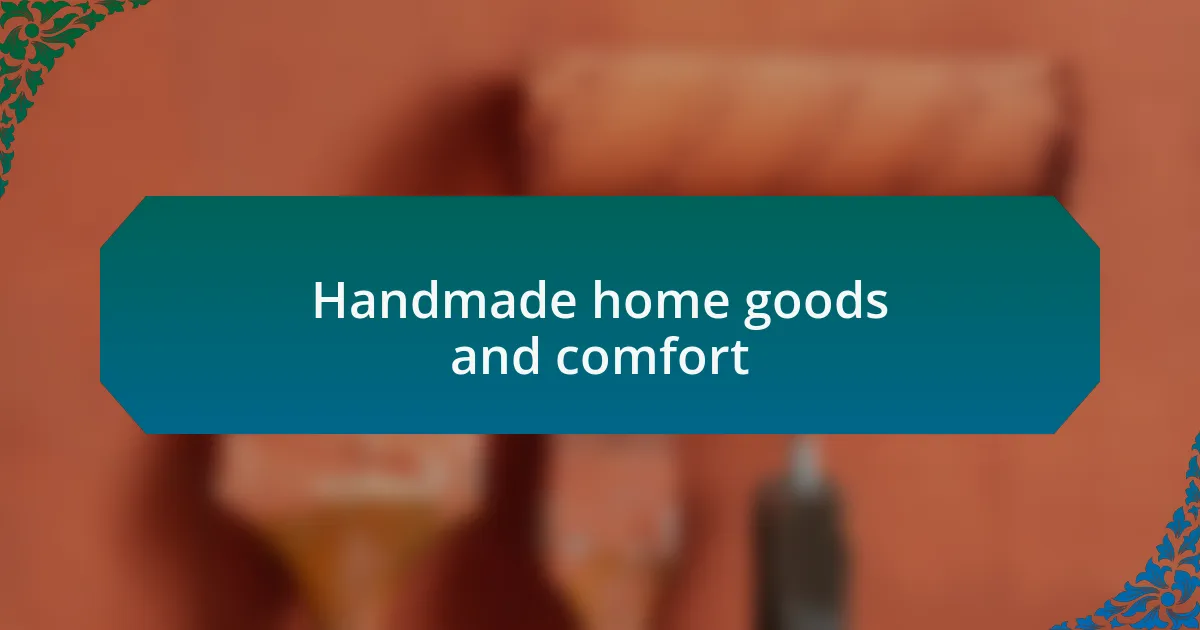
Handmade home goods and comfort
Handmade home goods have a unique ability to create a cozy atmosphere that mass-produced items simply can’t replicate. When I wrapped myself in a handmade organic cotton blanket during a chilly evening, the warmth felt more than just physical; it brought a sense of safety and comfort, like a gentle embrace from a close friend. There’s something about the craftsmanship that speaks to the heart, doesn’t it?
The tactile experience of handmade products often elevates the comfort level in our homes. For instance, I recently bought an organic cotton throw pillow crafted by a local artisan. The softness against my skin was heavenly, and it quickly became my favorite spot during movie nights. Have you ever noticed how certain textures can evoke feelings of nostalgia or peace? That’s the magic of handmade home goods.
Integrating handmade organic cotton items into my living space has not only enhanced comfort but also fostered a deeper emotional connection to my surroundings. It’s a small but significant reminder that the items we choose to surround ourselves with have stories and intentions behind them. Each piece becomes a conversation starter, inviting moments of reflection and appreciation. Isn’t it wonderful to think that comfort can also come with a personal touch?
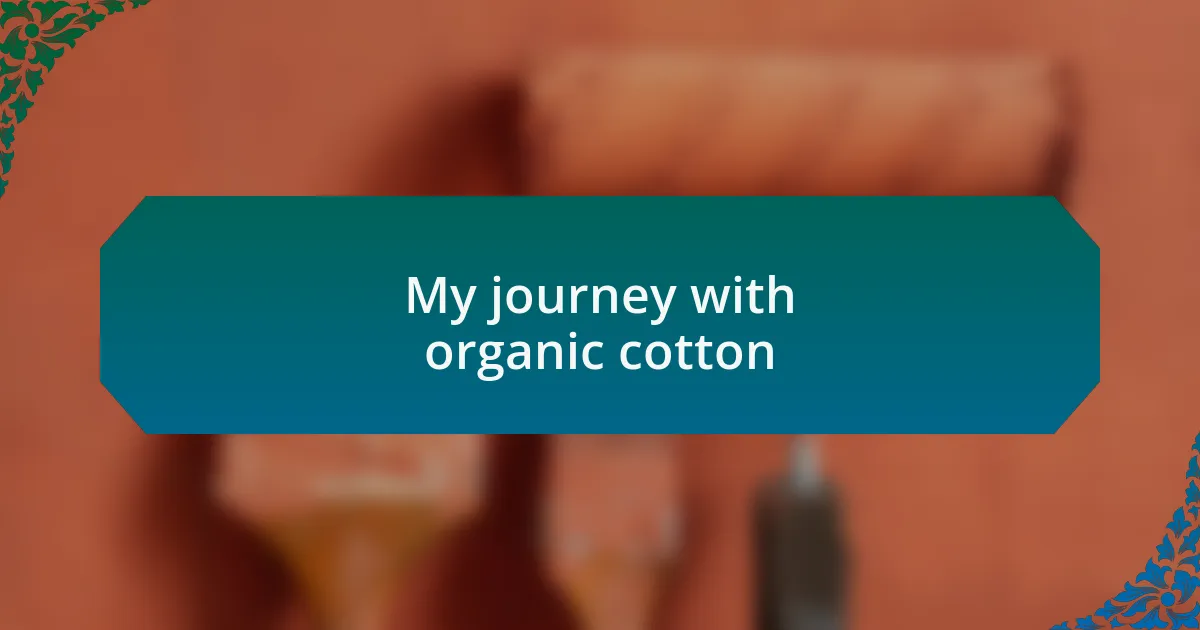
My journey with organic cotton
My journey with organic cotton began unexpectedly during a trip to a local farmers’ market. I stumbled upon a vendor selling organic cotton products and was instantly drawn to the vibrant colors and natural textures. I remember running my fingers over the fabric, feeling a connection to the earth that I had never experienced with conventional cotton. It made me wonder how many chemicals had plagued my other textiles—could they be part of why I experienced skin irritations?
As I incorporated organic cotton into my life, I discovered a profound sense of satisfaction. Each purchase felt like a small step towards sustainability, contributing to a healthier planet. I vividly recall buying my first organic cotton kitchen towel; I was astounded by its absorbency and softness compared to regular ones. Who knew a simple kitchen tool could influence my cooking experience so positively?
Over time, I’ve come to appreciate the ethical implications of choosing organic cotton. It’s not just about comfort; it’s about supporting practices that nurture the earth and those who cultivate it. When I hear stories of farmers committing to organic methods, it lights a fire in me. I think about how our choices ripple through communities—doesn’t it feel empowering to know that each purchase can support a healthier environment and more sustainable farming?
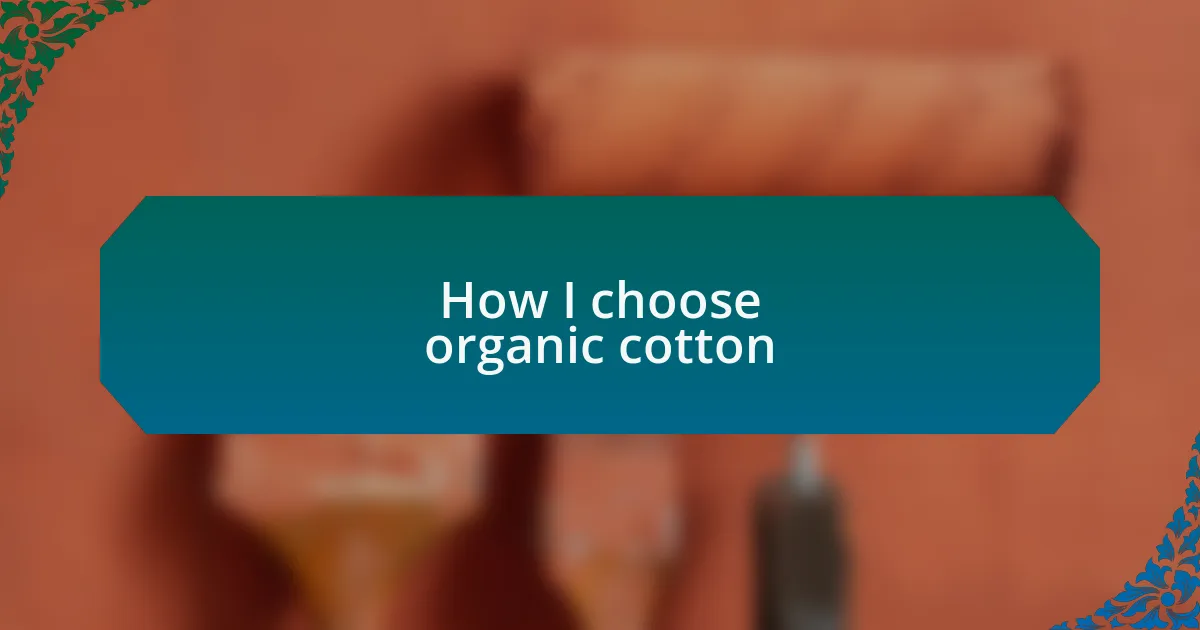
How I choose organic cotton
Choosing organic cotton is a thoughtful process for me. I tend to start by looking for certifications that ensure the cotton is truly organic, such as the Global Organic Textile Standard (GOTS). The first time I spotted that label on a product, I felt an immediate sense of relief; I knew I was making an informed choice. Have you ever felt that reassurance when you find a label that aligns with your values?
I also pay close attention to the sourcing stories behind the products. Recently, I came across a small brand that sources its organic cotton from family-run farms. The owners shared how their commitment to fair trade practices positively affects the farmers’ lives. It touched me deeply. Knowing that my purchase supports not only sustainable agriculture but also the livelihoods of these farmers adds a layer of meaning to each item I buy.
Another factor in my decision is the texture and feel of the fabric. I remember visiting a store where I found a beautifully soft organic cotton blanket. As I draped it over my shoulders, I couldn’t help but smile, realizing how it felt like a warm hug crafted from nature. Have you ever experienced that connection with a product? It’s those moments that solidify my preference for organic cotton in my home.